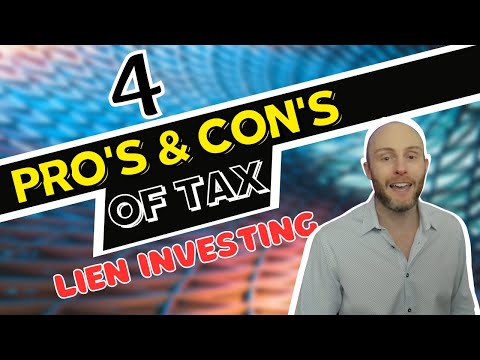When we talk about real estate investment, often minds dash towards flipping houses or renting properties. But there’s a lesser-known avenue that’s ripe for exploration: investing in tax liens. This strategy could potentially offer you a high-return investment (ROI) slice of the real estate pie without the need to own physical property. So, let’s unravel the mysteries around this intriguing investment opportunity.

The Intricacies of Investing in Tax Liens for Potential High ROI
Unveiling the Essence of Tax Lien Investing
To really understand tax lien investing, we’ve got to start at the grassroots. In a nutshell, when property owners don’t pay their property taxes, the county slaps a lien onto their properties. It’s essentially a legal claim against the assets for the unpaid amount. To recoup these funds, counties often auction these liens off. Here’s the kicker: how to invest in tax liens boils down to buying the right to collect on these debts, plus interest.
Investing in tax liens is like being in the lender’s shoes; you bankroll the unpaid taxes, and the property sports your financial flag until the debt is settled. The owner has to pay you back with interest, and if they don’t, well, you could end up with the property. It sounds simple, but the devil’s in the details, isn’t it?
Tax Yield Investments: The Opportunity They Present
Why would anyone get into tax yield investments? The hook is the lucrative potential yields from tax lien certificates. You can pocket alluring interest rates that can easily shadow what you’d earn from your average savings account or bond. We’re talking double-digits in some states!
Comparatively, tax liens can hold their own against stock dividends or traditional real estate gains. However, remember that high yield often buddies up with high risk, so keep your wits about you.

Strategizing Your Entry into Tax Lien Investing
Before you charge ahead, it’s crucial to do your homework. Different states – different rules. For instance, although Texas doesn’t sell tax lien certificates, they’re big on tax deed sales. Knowing your turf is half the battle.
And, there’s the investment game plan. Ensure your financial house is in order before you start waving that bidding paddle. You’ll need readily available cash and a cool head when bidding in auctions.

| Aspect of Tax Lien Investing | Details |
|---|---|
| Definition | A tax lien represents a legal claim against a property whose owner has failed to pay the required property taxes. |
| Negatives of an Existing Tax Lien | – Affects the property’s sellability – Limits bankruptcy relief – Damages credit scores – Can impair job prospects due to credit checks |
| Tax Certificates Request | – Available to anyone – $10 fee – Processing time: 3-5 business days |
| Texas Tax Foreclosure Sales | – No tax lien certificates for investors – Tax foreclosure sales allow bidding on foreclosed properties |
| Property Ownership in Texas | – Payment of taxes by a third party does not confer ownership – Ownership is determined by “clear title” |
| Investing in Tax Liens in New Jersey | – State permits tax lien investments – Standard interest rate: 18% per annum – Auctions use a down bidding process, starting from 18% |
| Risks and Considerations | – Potential loss of investment if the property owner redeems the property – Management of the lien (e.g., tracking redemption period) – Research required to evaluate property value and legal standing |
| Benefits of Tax Lien Investing | – High potential interest rates – Property ownership possibility if lien is not redeemed – Priority over other liens or claims in the case of bankruptcy or sale |
| Investment Suitability | – Suited for knowledgeable investors who are willing to conduct due diligence – Not advised for those seeking liquid or low-risk investments |
| Methods of Investment | – Direct purchase at tax lien auctions – Online platforms (where available) – Investment funds specializing in tax liens |
Mastering the Legality and Due Diligence in Tax Lien Investing
Navigating the Legal Framework of Tax Lien Sales
Legal mumbo jumbo can be intimidating, but in tax lien investing, it’s the ABC. You ought to know what you’re getting into and what you can do if repayment doesn’t come easily. Tax lien certificates bestow certain rights, yet they respect the legal boundaries of the property owner.
Understanding the state-specific landscapes is pivotal. For instance, in the Garden State, New Jersey tax lien certificates tantalize with rates of up to 18% per annum. But, as the sages say, with great rates come great bidding wars.
The Importance of Comprehensive Due Diligence
“Measure twice, cut once”—this old chestnut is your due diligence mantra. It’s not just about researching the property; it’s also about knowing its title’s cleanliness. Mishaps here can turn your investment dream into a nightmare.
Avoiding pitfalls requires critical research — property condition, neighborhood stability, and the infamous liens. Overlook these, and your investment could sink faster than a stone in a pond.

The Real Returns: Understanding Tax Yield Payout in Tax Lien Investments
Let’s cut to the chase: the financial breakdown. The ROI from tax liens sings a simple tune—it’s your invested amount, the accrued interest, and sometimes a cherry on top in the form of fees. Yet, the reality is often more convoluted.
For a vivid picture, imagine buying a lien, the owner redeems, and voilà—you’ve just made a tidy sum over a (hopefully) short period. A commendable patience game, I say!

Advanced Tax Lien Investment Strategies for Enhanced ROI
For the veterans in the room, strategies to up the ante might involve leverage or eyeing tax lien funds. These moves can amplify returns but also risk. Always liken it to walking a tightrope—you must maintain a steady balance.
Some investors prefer the lone wolf path, picking off liens one by one. Others, however, favor the pack mentality, pooling resources for potentially bigger kills.
The Road Less Traveled: Case Studies of Successful Tax Lien Investing
Ah, what’s more inspiring than a good success story? It’s the strategies, bold moves, and cool-headed calculations that charted their path to tax lien victory.
Like that savvy investor who cherry-picked properties in up-and-coming areas or the eagle-eyed lien holder who swooped down on an overlooked gem. These tales are the educational treasure maps for your journey.
Risk Assessment in Tax Lien Investing: Ensuring an Informed Decision
High ROI? Possibly. But tax lien investing isn’t a free lunch. The risks lurking can snap at your portfolio’s heels—property depreciation, bankruptcy dramas, or simply being outbid.
Risk mitigation is your guardian angel. Diversify, research, and keep your investments under the prudent eye. Consider the effect a tax lien has on creditworthiness—yours or the previous owner’s.
Tax Lien Investing in 2024: Trends and Predictions
The investment landscape is like a river, always flowing, always changing. With the economy’s ebb and flow, tax lien investing could see shifts in interest rates or property values.
Stay abreast of economic currents and regulations, or be prepared to paddle harder. The informed investor will always have a sharper axe to grind.
The Future of Digitalization in Tax Lien Auctions and Investments
Gone are the days of musty courthouse steps and paper lists. Online auctions and Rent Manager software have revolutionized the tax lien marketplace. Convenience and a broader reach are the twinkle in today’s investor’s eye.
As for the future, expect more pixels and less paper. Technology has set the stage for a more streamlined tax lien saga.
Innovative Wrap-Up: Casting Light on the Path Forward in Tax Lien Investment Journeys
Well, here we are at the end of our tax lien odyssey. Remember, investing in tax liens could be your golden ticket or cautionary tale—wisdom dictates you decide which.
We’ve journeyed through the ROI potential and stepped through the dos and don’ts. Now, it’s your move. Keep your ear to the ground, your eyes on the horizon, and your investments in check.
Tax lien investing is a unique adventure, filled with twists and opportunities for those bold enough to take the steps. Ride the wave, but always, always wear your life jacket.
So there you have it folks: a go-getter’s guide to tax lien investing. Who knows, with due diligence, legal savviness, and a bit of well-placed strategy, you could be on your way to an investment triumph. Happy hunting!

How to buy tax liens in tx?
Oh boy, buying tax liens in Texas is a whole different ball game! First things first, you’ll want to head over to county tax auctions, where these liens are typically sold. Keep your eyes peeled for announcements on county websites or give them a ring since each county rolls a bit different. But remember, you’re buying the lien, not the property, so it’s about as straightforward as a cowboy’s lasso!
Do you own the property if you pay someone’s property taxes in Texas?
Hold your horses there, partner! Paying someone else’s property taxes in Texas doesn’t mean you can just waltz in and claim their ranch. What you get is a lien on the property, which means you could eventually foreclose on it but owning it outright? Nah, that’s not how the cookie crumbles.
Can I buy tax liens in NJ?
Pondering over tax liens in the Garden State, are ya? Well, you can indeed buy tax liens in New Jersey through tax sales held by the municipalities. Brush off your bidding skills, because it’s auction time, and you might just snag a good deal there!
How do I check for tax liens in Texas?
Looking for tax liens in Texas? Well, it’s no secret treasure hunt. All you’ve got to do is scoot on over to the county tax assessor-collector’s office or visit their website. They’ve got the scoop on any lingering liens, so you can check without breaking a sweat!
How many years can you go without paying property taxes in Texas?
In the Lone Star State, you can ride out for a bit—up to five years, to be exact—without paying property taxes before the sheriff comes knockin’. But don’t push your luck; if you’re hankering to keep your homestead, it’s best to pony up those taxes pronto.
How long does a tax lien last in Texas?
Yeehaw, a tax lien in Texas can stick around like a burr on a saddle blanket! Until you pony up the dough to clear it, a tax lien has no expiration date; it’s as enduring as a Texas prairie.
How long do you have to occupy land before it becomes yours in Texas?
If you’re dreaming of snagging some land in Texas by just popping a squat on it, you’re gonna need some patience. It’s a process called “adverse possession,” and you’ll need to warm that seat for at least 10 years. And let’s be clear, there are a few more hoops to jump through than just hangin’ your hat there.
Who is responsible for paying property taxes when owner dies in Texas?
Well, the grim reaper doesn’t pay taxes, and neither do the dearly departed. In Texas, when someone kicks the bucket, it’s up to the heirs or the estate to handle the property taxes. If there’s a will, there’s a way; otherwise, the state has a few tricks up its sleeve to sort it out.
Can you gift property in Texas?
Absolutely, you can gift property faster than a hot knife through butter in Texas. Just sign on the dotted line of a deed, but don’t forget – you’ll need to do a little paperwork shuffle at the county recorder’s office to make it official. Maybe even throw in a bow for good measure!
How do tax liens work in New Jersey?
In New Jersey, tax liens are like a game of Monopoly. When property taxes are left unpaid, the town holds a tax sale. Investors can then buy these liens, earning interest and possibly even the deed if the owner doesn’t pony up the cash to redeem it. Talk about passing ‘Go’ and collecting $200!
How do I pay off a tax lien in NJ?
When you’re ready to unload that tax lien in NJ faster than a Jersey Turnpike exit, just cough up the full amount owed, including any interest and penalties, directly to the municipality. They’ll clear it quicker than you can say “Bruce Springsteen” and you’ll be back to cruising lien-free.
How do I redeem a tax lien in NJ?
Redeeming a tax lien in NJ? Time to get your ducks in a row. Pay off the full shebang – taxes, interest, and a side of fees – to the lienholder or the tax collector before the redemption period clocks out, and Bob’s your uncle, you’re home free!
How do I buy a struck off property in Texas?
Caught wind of a struck-off property in Texas? It’s like finding a lone star in the night sky. Swing by the county where the property’s located and look into any properties that didn’t sell at tax sale. They might just let you snag it for the back taxes owed, plus any penalties.
What does a tax lien mean in Texas?
Here’s the skinny: a tax lien in Texas is the government’s way of telling you they’re holding onto your property tighter than a bull rider because you’ve got unpaid taxes. They’ve got dibs on the cash from any sale before anyone else gets a piece of the pie.
Are liens legal in Texas?
Legal as a longhorn on the range, liens in Texas are a tool the law uses to make sure debts get paid—one way or another. When there’s a lien against your property, it’s like having a cowboy hat that you can’t tip until the debt’s settled.
How do I buy a struck off property in Texas?
Back at the rodeo for buying struck-off properties in Texas? Here’s the lowdown: post-auction, unsold properties get another chance at the county courthouse steps. Bring your wallet, because you’ll need to cover any back taxes and fees to call that land your home range.
How do I search for a lien on a property in Texas?
Snoopin’ for a lien on a property in Texas? Just mosey on over to the county clerk’s office or check their online databases. It’s like digging for gold in the old West—you’ll find the dirt on any liens filed against the property there.
Are liens legal in Texas?
Yup, liens in Texas are as legal as a sheriff’s badge. They’re the state’s way of ensuring folks pay their dues, and they’re about as easy to ignore as a rattlesnake at a picnic.
Can you sell a property with a lien Texas?
Selling property with a lien in Texas can be trickier than a barrel race. You sure can sell, but that lien has got to be settled up—paid off or passed on to the buyer—quicker than a jackrabbit, or it’ll stick around and cause a heap of trouble for everyone involved.



